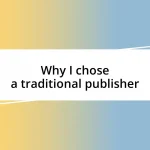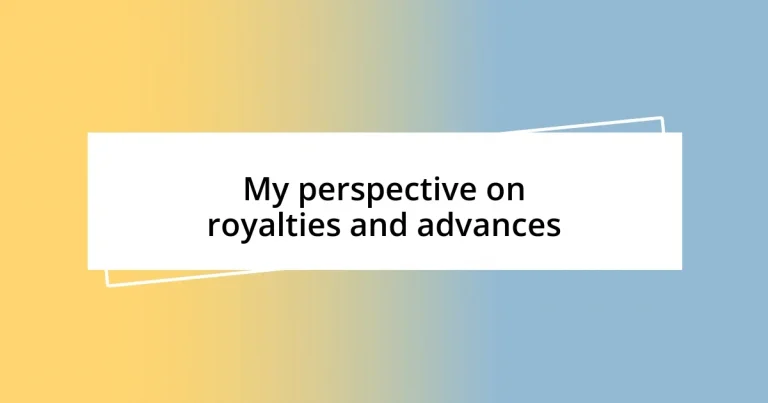Key takeaways:
- Advances act as loans against future earnings, creating pressure to meet sales thresholds for additional income through royalties.
- Calculating royalties varies by industry (music, publishing, film/TV), with different methods and factors influencing total earnings.
- Effective negotiation involves understanding industry standards, being prepared, and finding a balance between firmness and flexibility to secure fair agreements.
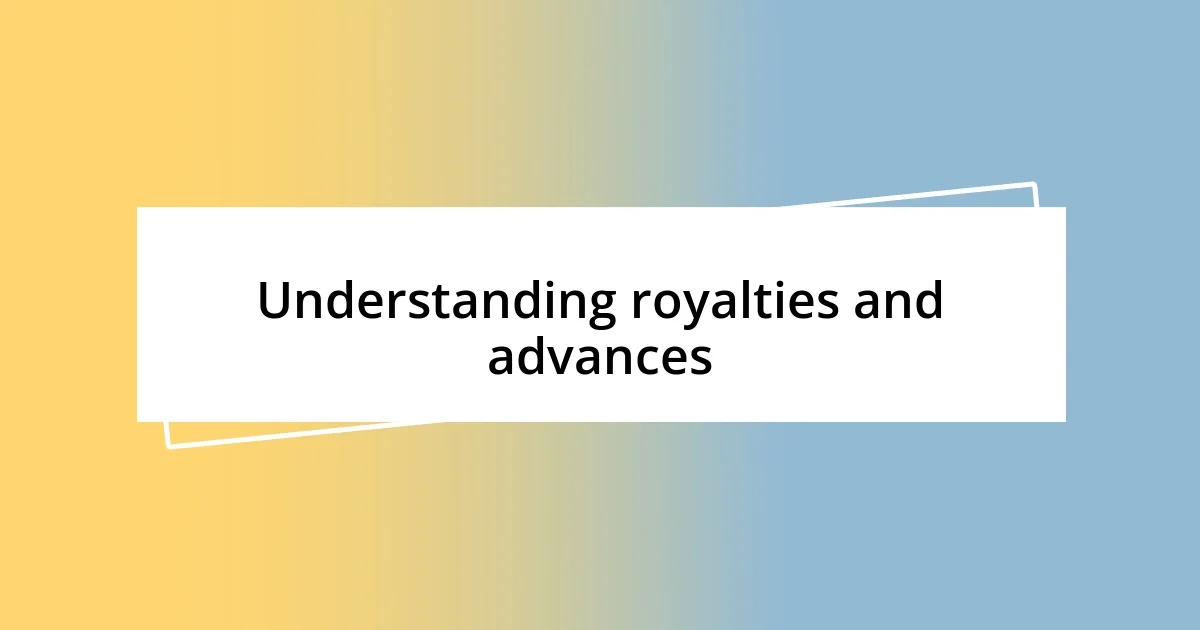
Understanding royalties and advances
Understanding royalties and advances is crucial to navigating the financial landscape of creative industries. Have you ever wondered how the excitement of receiving an advance might quickly be tempered by the realization that it’s essentially a loan against your future earnings? I remember when I received my first advance; it felt like a windfall, but I soon learned that understanding the terms behind it was just as important as the money itself.
Royalties, on the other hand, are a bit more elusive. They represent the ongoing payment you receive from your work, often calculated based on sales or usage. I recall a friend of mine who thought royalties would roll in effortlessly after the initial release of her album. Instead, she discovered that sales fluctuated over time, and so did her earnings. It was a tough lesson, one that made her appreciate the importance of monitoring her sales data closely.
When I think about how advances can sometimes create pressure—especially when you’re racing against time to produce work—you realize that there’s a fine balance at play. Do you think about that pressure when you see others in the industry rushing to meet their deadlines? It’s a reminder that while advances provide initial support, the journey of earning through royalties is often a marathon, not a sprint.
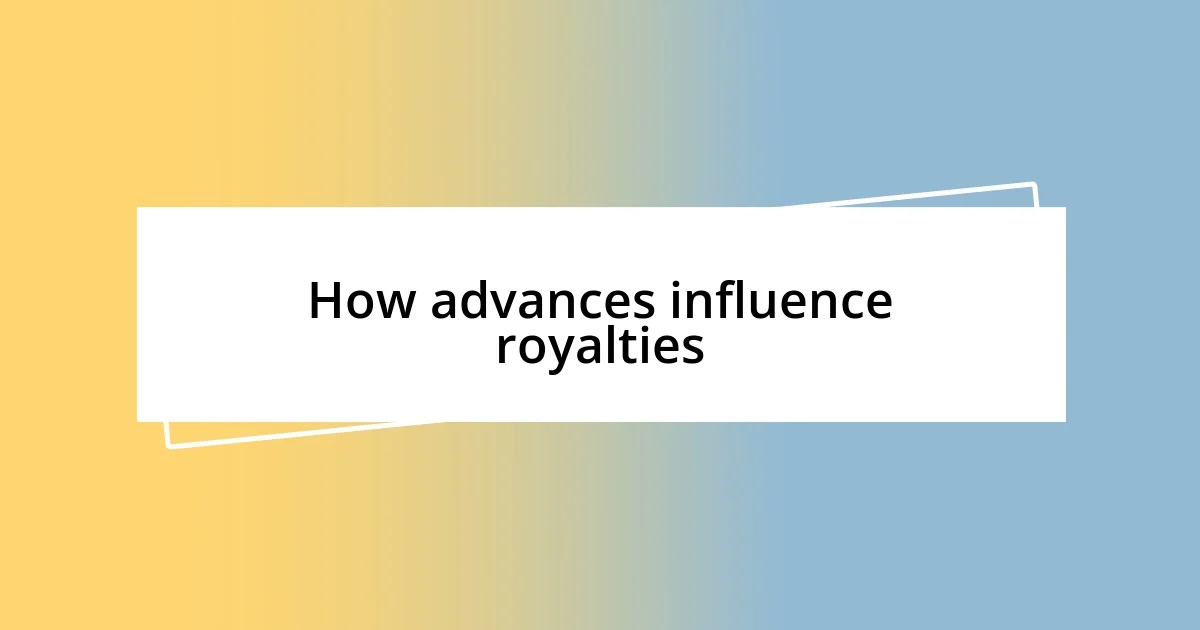
How advances influence royalties
Advances can significantly influence how royalties are perceived and ultimately earned. When I received my first substantial advance, it felt like my financial worries melted away. However, it quickly dawned on me that this ace up my sleeve came with strings attached. I’d need to earn out that advance through royalties before I saw any additional income. It’s almost like an invisible line drawn in the sand; once you cross it, your earnings start to flow freely.
- The advance is deducted from future royalty earnings.
- Artists need to reach a specific sales threshold to earn royalties after an advance.
- Understanding how your royalties stack up against the advance is key to financial planning.
- Advances can create a sense of urgency, pushing creators to expedite their work.
I know several creators who miscalculated their sales and ended up feeling shortchanged because they didn’t track their royalty statements closely. It’s like running a race with a weight attached to your ankle; until you shed that advance, you feel the pressure and urgency to deliver. This balance between enjoying an advance and being on the hook to earn it back can create a whirlwind of emotions, reminding us that financial security in this industry is often a game of strategy as much as it’s about creativity.
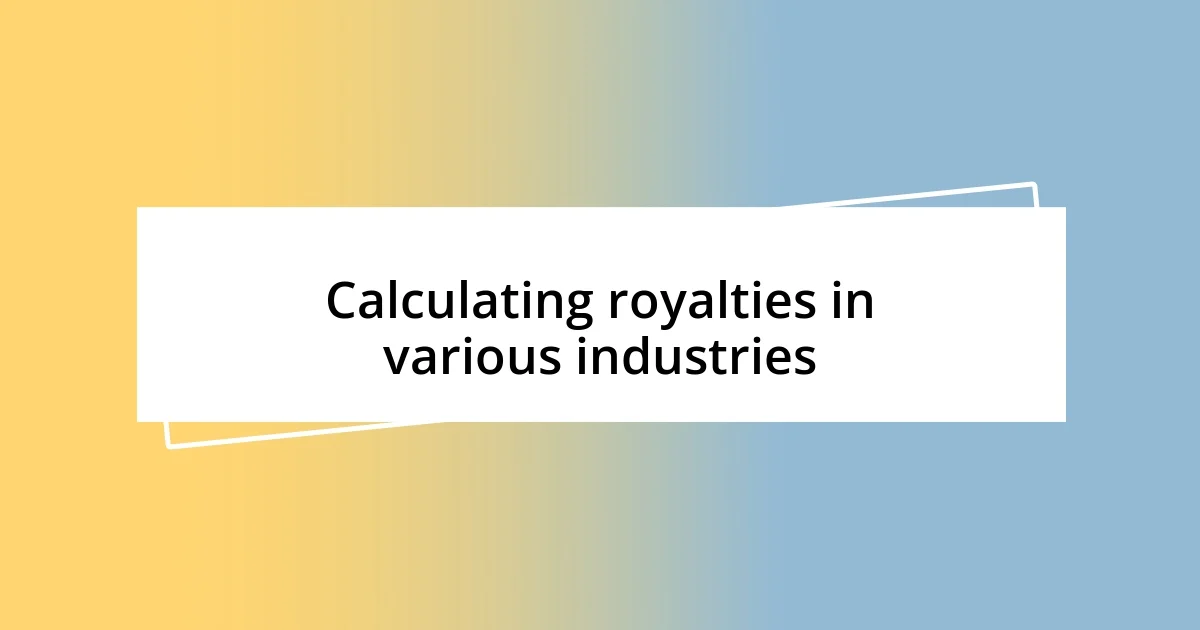
Calculating royalties in various industries
Calculating royalties can vary dramatically across different industries, each with its unique methods and considerations. For instance, in the music industry, royalties are typically calculated as a percentage of sales, which can fluctuate based on streaming services or album sales. I vividly remember the confusion I felt when I first saw my royalty statements; the figures often seemed like a puzzle with missing pieces, revealing just how critical understanding the various revenue streams was.
In publishing, the royalty landscape shifts again. Authors typically earn a percentage of the book’s sale price, which can be significantly different based on whether the book is sold in hardcover, paperback, or digital format. I once had a friend who published a debut novel; her excitement quickly turned into concern when she realized her digital sales were significantly outpacing the physical copies, impacting her overall earnings. This experience highlighted the importance of knowing how each format plays a role in total royalties.
Lastly, the film and television industry often employs a different approach altogether. Royalties may come from license fees, rerun rights, or sales of merchandise tied to the content. This can make calculating them even more complex. When I produced a short film, the experience of calculating potential royalties felt like chasing shadows—many variables were at play, making it essential to grasp how each component influenced my earnings.
| Industry | Calculation Method |
|---|---|
| Music | Percentage of sales based on format (e.g., digital, streaming) |
| Publishing | Percentage of sale price (Varies by format) |
| Film/TV | License fees, rerun rights, and merchandise sales |
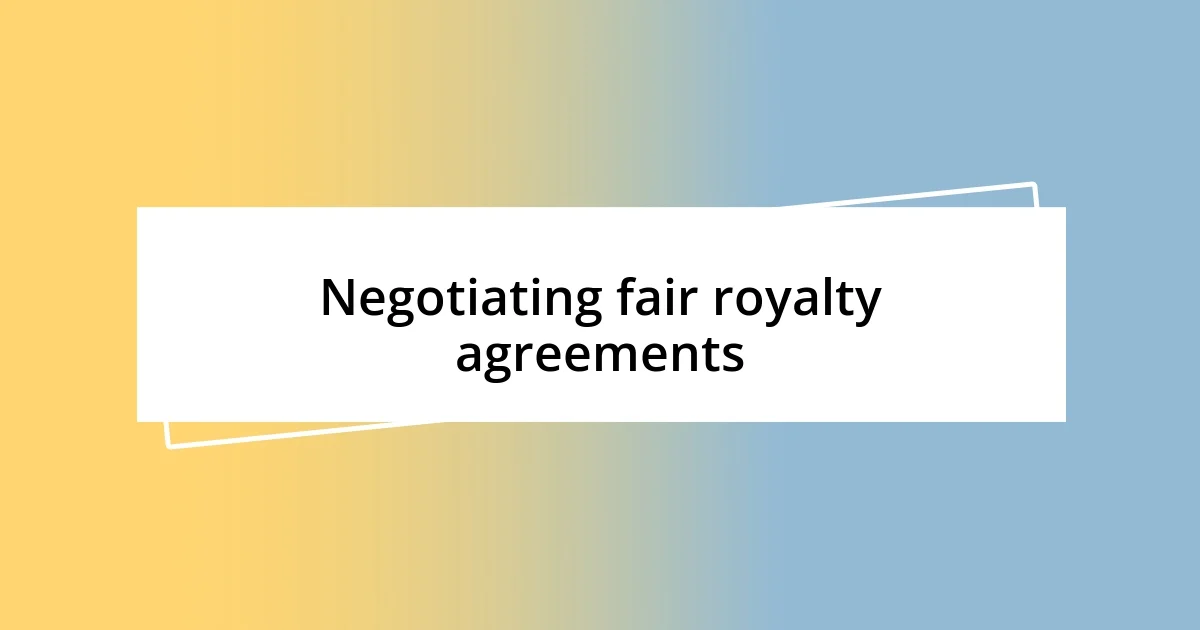
Negotiating fair royalty agreements
Negotiating fair royalty agreements can feel like navigating a minefield, especially for newcomers. I recall my first attempt at discussing royalty percentages; I approached it nervously, wondering if I was undervaluing my work. It’s crucial to remember that feeling confident in what you bring to the table can significantly influence the conversation. If you don’t advocate for yourself, who will?
One strategy I’ve found effective is to come prepared with industry standards and benchmark data. During one negotiation, I discovered that my peers were earning a higher percentage than what was initially offered to me. Armed with these insights, I presented my case, explaining my unique contributions and the value I could offer. This approach not only made the negotiation feel more collaborative but also instilled a sense of respect from the other party. Have you ever felt caught off guard in such discussions? If so, remember, knowledge is empowering.
I’ve also learned to appreciate the power of flexibility. While it’s vital to establish a fair baseline, being open to creative compromises can yield unexpected benefits. For example, I once agreed to a slightly lower royalty percentage in exchange for more robust marketing support—this decision boosted my visibility massively in the long run. Balancing firmness with adaptability creates a richer negotiation experience, ultimately leading to agreements that benefit both sides.
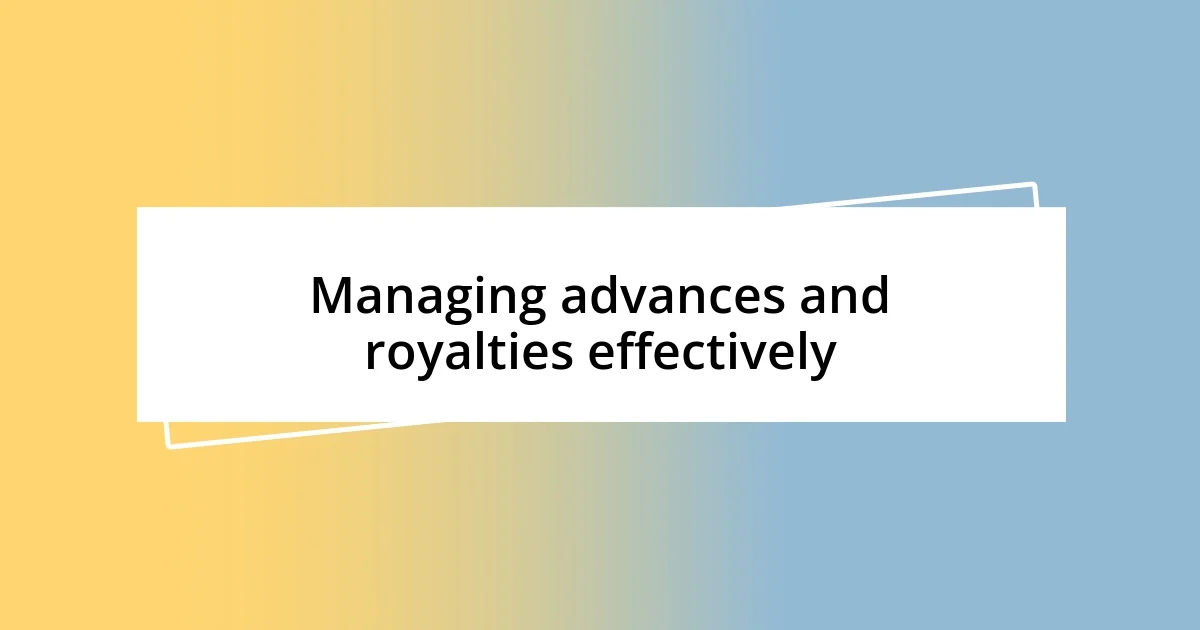
Managing advances and royalties effectively
Managing advances and royalties effectively requires a keen understanding of cash flow. I’ve often seen creators pour their advances into new projects without a solid plan for future expenses. Balancing spending with the knowledge that royalties can come in waves is crucial; I learned this the hard way when pursuing a dream project led to a dry spell, and my finances felt stretched thin. Have you ever found yourself in a similar bind?
Budgeting becomes essential when considering the unpredictable nature of royalty payments. One year, a significant spike in my royalties from a licensing deal caught me off guard, leaving me with extra funds. I still recall the overwhelming excitement and the temptation to splurge, but I resisted and instead set aside a portion for taxes and future projects. Establishing a reserve can help mitigate financial stress later on.
Additionally, keeping meticulous records of your income from advances and royalties can prove invaluable. When I scrutinized my earnings statements, tracking each source illuminated trends I had overlooked, like the surprising impact of seasonal sales fluctuations. Are you keeping a close eye on your revenue streams? By analyzing this data regularly, you can make informed decisions about when to invest in your next venture or even negotiate your future contracts more effectively.


